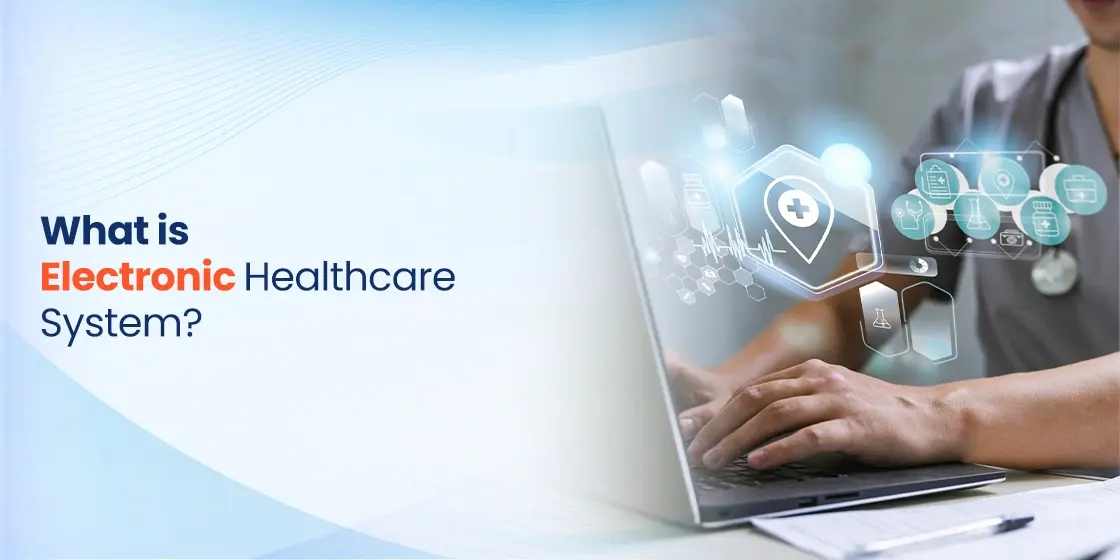Table of Content
Understanding How EHR Works & What Are Its Key Benefits
Modern technology has played a massive role in the advancement of healthcare industry. The emergence of different advanced electronic systems have allowed hospitals to automate the services of healthcare greatly. From diagnosis chronic disease to managing tons of patient data, medical organizations use electronic healthcare system to streamline their day-to-day operations. This is why their demand in the market is also increasing, and medical institutions are looking to take custom software development services to get their hands on these systems.
The development of an electronic healthcare system is quite different from the conventional software products. It is a standalone product that requires custom development as per the specific demands of the hospital. That is why the cost of these systems is also very huge. They do take a lot of time for development, and are generally deployed after running a variety of tests. The margin of error in these systems is simply next to zero, which is why professionals are always hired to develop them efficiently.
If you are also interested in building a next-gen electronic healthcare system, this blog will prove to be a good read for you. It will let you know how these systems should be developed keeping different important things in mind. Let us first start from the basics understanding what is an electronic healthcare system and why it is so much important for the hospitals in the medical industry.
What is an Electronic Healthcare System (EHR)?
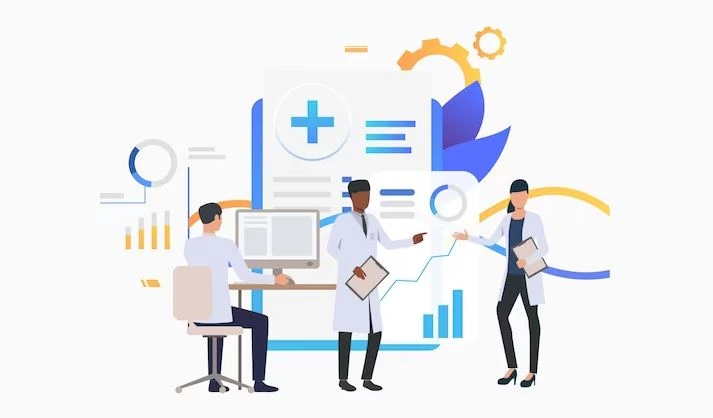
An electronic healthcare system, often referred to as an Electronic Health Record (EHR) system, is a comprehensive and integrated digital platform designed to manage patient health information in a secure and organized manner. It replaces traditional paper-based records with electronic versions that can be easily accessed, updated, and shared by authorized healthcare providers. The primary goal of an electronic healthcare system is to enhance the efficiency and quality of healthcare delivery by providing a centralized repository for patient data.
At its core, healthcare software development includes features such as patient demographics, medical history, medications, allergies, laboratory results, imaging reports, and other relevant health information. These systems enable healthcare professionals, including doctors, nurses, and administrative staff, to access and update patient records in real-time.
Moreover, electronic healthcare systems contribute to improved patient safety and outcomes by reducing the likelihood of errors associated with paper-based records, such as illegible handwriting or misplaced files. Additionally, these systems often incorporate decision support tools, reminding healthcare providers of best practices, drug interactions, and preventive care measures.
Importance of Electronic Healthcare System

The two core importance of an electronic healthcare system lie in its ability to enhance patient care and streamline healthcare processes. Firstly, electronic healthcare systems significantly improve patient care by providing a centralized and readily accessible repository of comprehensive health information. This accessibility ensures that healthcare providers have instant access to a patient’s medical history, medications, allergies, and various types of test results.
In emergency situations, quick access to critical information can be lifesaving. The electronic format also reduces the risk of errors associated with traditional paper records, such as misinterpretation of handwriting or lost documents, ultimately contributing to increased patient safety and improved healthcare outcomes.
Electronic healthcare systems play a pivotal role in streamlining healthcare processes and promoting efficiency. The digital nature of these systems facilitates seamless communication and collaboration among different healthcare stakeholders, including physicians, nurses, laboratories, and administrative staff. This streamlined communication enhances care coordination, reduces duplication of tests and procedures, and minimizes delays in treatment.
Core Features of an Electronic Healthcare System
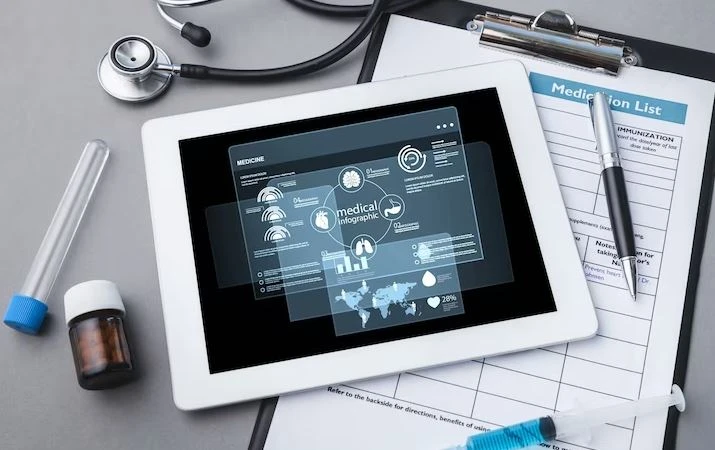
An electronic healthcare system comes up with different types of advanced features. Using them, doctors can perform variety of complex medical operations including diagnosis, checkups and other jobs quickly. They are designed in every electronic healthcare system as per the functional requirements of hospitals. Let’s take a quick look at them below.
Integrated Analytics
In the healthcare industry, the significance of data analysis and reporting cannot be overstated. These processes are indispensable for monitoring and assessing performance metrics, as well as for obtaining valuable insights into patient outcomes. As such, a robust Electronic Health Record (EHR) system should go beyond the basic storage of patient information; it should integrate sophisticated analytics tools. These tools empower healthcare providers by allowing them to swiftly and accurately generate reports that delve into various aspects of patient care.
To further elevate the capabilities of an EHR system, the inclusion of an IoT-powered analytics module becomes imperative. This advanced IoT in healthcare feature can actively alert doctors to any notable changes in a patient’s health status or alterations in their medication regimen. This real-time monitoring and notification system not only facilitates prompt intervention but also equips healthcare professionals with the necessary information to make informed decisions about patient care.
Detailed Patient Portal
A patient portal serves as a pivotal component in fostering a more interactive and engaged healthcare experience for individuals. It goes beyond merely granting access to patient records; it empowers patients by providing a comprehensive platform where they can access relevant information about their care. This includes the ability to schedule appointments with healthcare providers, view detailed invoices, and receive timely reminders for upcoming appointments.
Furthermore, the patient portal should serve as a dynamic tool for individuals to actively manage their health. It should enable patients to not only access but also track their health history and medication regimen. This functionality promotes a proactive approach to healthcare, allowing patients to stay informed about their ongoing treatment plans and medications. Additionally, the portal should provide users with the flexibility to make necessary edits to their personal health records, ensuring that the information remains accurate and up-to-date.
Advanced Lab Reporting
In the healthcare industry, the effectiveness of an Electronic Health Record (EHR) system is significantly bolstered by its ability to seamlessly integrate with external laboratory systems. This integration serves as a crucial link, allowing healthcare providers access to and analysis of patient laboratory results. Such interconnectivity ensures that healthcare professionals can swiftly make informed decisions based on the latest and most accurate data, thereby mitigating the risk of care delays attributable to inaccurate information or communication breakdowns.
As per the modern industry standards, the EHR system should boast advanced analytics capabilities, allowing for the extraction of valuable insights from patient records. This goes beyond the mere presentation of raw data; the system should empower healthcare professionals to discern trends and patterns within the patient population, facilitating a deeper understanding of health conditions and informing more strategic and data-driven decision-making.
Different Communication Methods
A robust health record system should encompass a diverse array of communication options to facilitate seamless interactions among healthcare providers and between providers and their patients. This comprehensive approach includes communication channels such as email, text messages, telephone calls, and video chats. By offering multiple communication avenues, the system ensures that healthcare professionals can easily collaborate with one another or reach out to their patients promptly.
A well-designed healthcare cloud computing system goes beyond basic communication functionalities, offering a diverse range of options for seamless and secure interactions. The availability of 24×7 communication features not only enhances the quality of care but also contributes to the overall efficiency of healthcare delivery. The incorporation of end-to-end encryption is crucial to instill confidence in patients regarding the confidentiality and security of their health information within the digital ecosystem.
Understanding the Workflow of an Electronic Health System
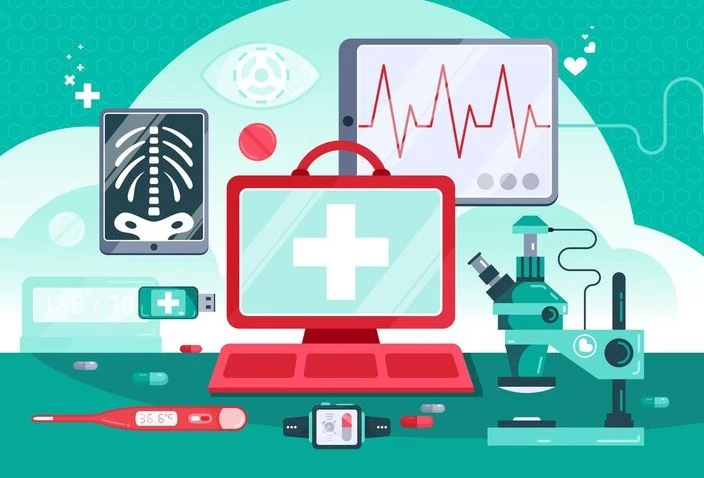
To develop an electronic healthcare system, you need to first understand its overall workflow. It is the basic requirement to build an advanced EHR system. It comprises of different modules built to cater a variety of medical functions. If you do not know much about them, take a look at the list defined below.
Patient Data Management
At the core of the healthcare management system is the patient module, a comprehensive tool designed to oversee and organize a wealth of information associated with individual patients. This encompasses essential demographic details, intricate medical histories, medication allergies, and various pertinent data. Beyond mere data storage, the patient module is equipped with functionalities that extend to the creation of new patient accounts, facilitating seamless onboarding into the healthcare system.
The patient module serves as the cornerstone of the healthcare management system, managing and organizing intricate patient information while offering a suite of functionalities that go beyond data storage. Its ability to generate and store a wide range of patient-related documents streamlines healthcare processes, contributing to improved patient care, informed decision-making, and a more efficient and integrated healthcare delivery system.
Front Operations Panel
The front-end operations module assumes a pivotal role in overseeing and optimizing various front-end activities within a healthcare system, encompassing key functions such as check-in, appointment booking, and billing. Beyond its operational functionalities, this module also extends its capabilities to accessing patient records, facilitating the creation and updating of charts, and meticulously tracking patient visits throughout their healthcare journey.
The front-end operations module serves as the linchpin for the efficient functioning of front-end activities in healthcare systems. Its multifaceted capabilities, ranging from appointment booking to billing, coupled with a user-friendly interface, contribute to a more streamlined and accessible healthcare management system. As a result, healthcare professionals can navigate and manage patient data with greater ease, fostering a more efficient and patient-centric approach to healthcare delivery.
Physicians Module
Next up, we have got the specific module of physicians management. It is primarily built to manage the record of all the doctors and physicians working in the hospital. It comprises of their names, daily attendance, appointments, and other attributes. This information helps the administrators to keep a check on the activity of physicians. They get to know about the daily routine of every doctor who is employed in the hospital to perform specific jobs.
With this information, it becomes easier for authorities to manage doctors. Sometimes, this module contains an additional feature of patient management. It is built to cater the tracking data of patients who are coming to the hospital for checkups. That is how admins assign doctors to those patients through this centralized system. It keeps everything organized, so that transparency can be achieved in the hospital management.
Lab Results Panel
A separate module is also designed in the electronic healthcare systems to facilitate doctors in the checkup of lab results. This works as a primary panel where doctors can see results of different tests. It makes easy for them to regularly see the status of lab results. Generally, doctors have to rush to the lab every time to get the patient results. This wastes a lot of their time, forcing their attention to get distracted.
With the help of this panel, the checkup and monitoring of lab results become all too easy for them. It provides a streamlined approach to see what results are coming from the lab after the lengthy process of diagnosis. This panel can differ as per the designation of each doctor, as lab results are usually given to the senior doctors.
Key Benefits of Electronic Healthcare System
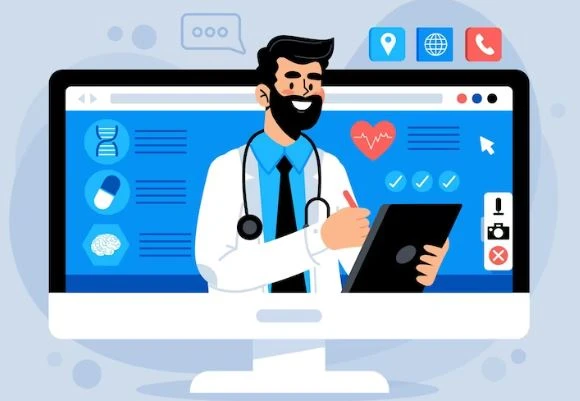
The usage of an electronic healthcare system brings plenty of benefits for a hospital. It is a system built with different types of features, allowing doctors to perform several jobs efficiently. Let’s take a look at some of its key advantages in detail below.
Effortless Patient Management
Working with an EHR system, it becomes easy for doctors to manage the patient’s data. The system provides a complete panel to see the records of different patients. Using this, a doctor can see the previous history of different patients and devise treatment plans accordingly.
Reduced Costs
An electronic healthcare system helps to reduce the functional cost of hospitals. It allows administrators to automate different tasks that are usually done manually. That is how time and money are both saved, enabling doctors to pay more attention on their core jobs.
Better Productivity
With the help of an EHR system, better productivity can be achieved at the work. It streamlines different technicals jobs, allowing doctors to pay more focus on the work. This usually leads towards better productivity, as well as timely completion of every task as the work.
Final Words
That brings us to the end of this blog in which we have discussed the importance of electronic healthcare systems in the medical industry. These systems are getting a lot of demand lately, as many hospitals are deploying them to take their digital transformation to the next level. They are built with plethora of features that allow doctors to perform various jobs efficiently. This blog has also discussed why these products are becoming necessary for the hospitals, especially those that regularly deal with the influx of many patients.
Meanwhile, if you are looking for a company that could help you to create an electronic healthcare system perfectly, get in touch with us today. Our expert developers can help you to create all types of medical software products as per the needed requirements.
